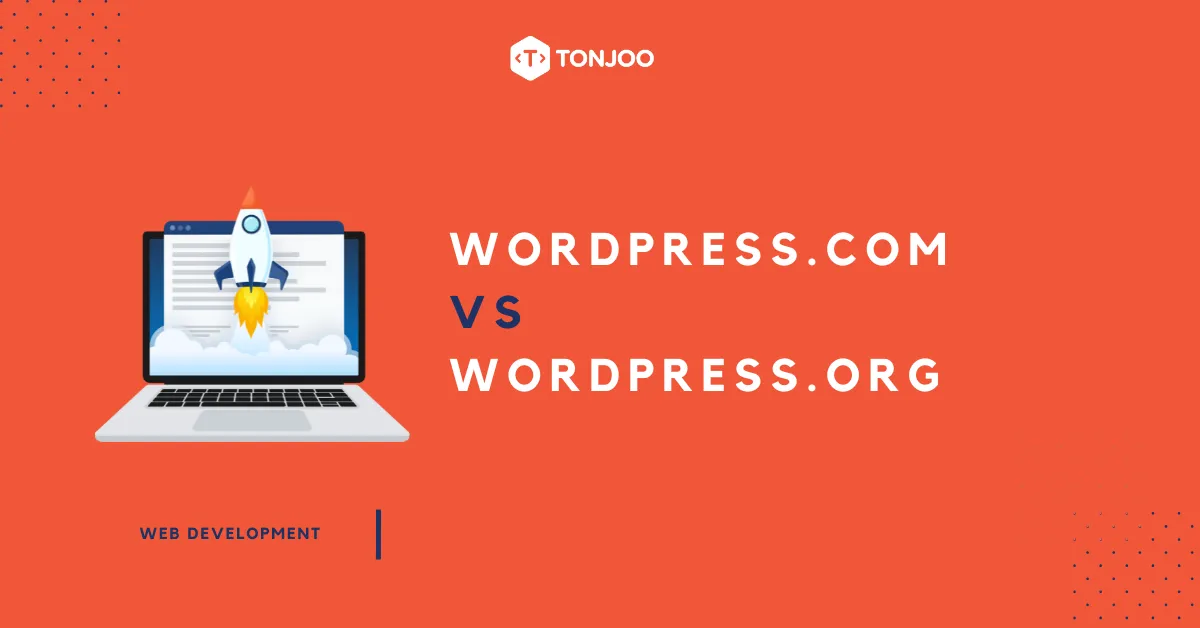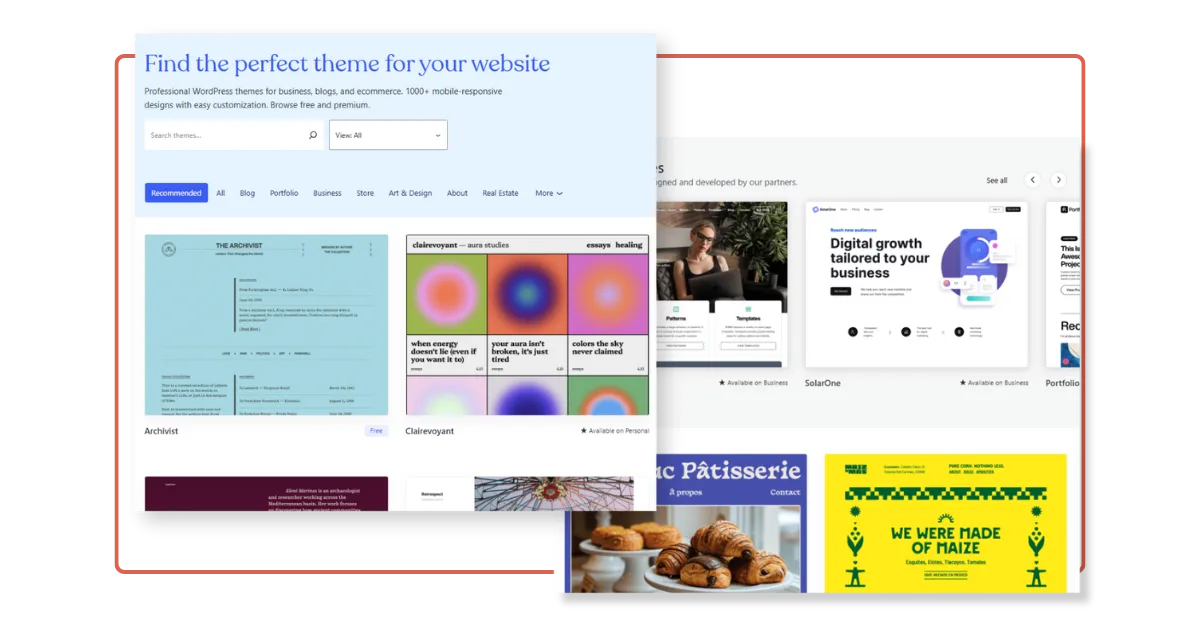
Planning to build a WordPress site but confused about whether to choose WordPress.com or WordPress.org? To make your decision easier, let’s explore the differences between WordPress.com and WordPress.org in this guide.
It’s a common point of confusion, as both systems are based on the same WordPress foundation. That’s why the Tonjoo team is here to break down the WordPress.com vs. WordPress.org debate.
To help you understand clearly, we will cover the following points:
- Definitions of WordPress.com and WordPress.org.
- The advantages and disadvantages of each platform.
- A detailed comparison of WordPress.com vs. WordPress.org.
Ready? Let’s get started.
Table of Contents
WordPress.com vs. WordPress.org

WordPress offers two distinct services for creating a blog or website: the .COM and .ORG versions. Most people assume these are the same because they share the WordPress name, but they are fundamentally different.
WordPress.com is a blogging platform that uses an automated system. It’s a simplified, user-friendly version for creating a WordPress blog or website with ease and convenience.
On the other hand, WordPress.org is the content management system (CMS) most people refer to as the “real” WordPress. In short, this term refers to the downloadable WordPress software used for building websites.
Still a bit confused? Let’s continue by examining the definitions, characteristics, pros, and cons of each service in more detail.
What is WordPress.com?

WordPress.com is a service that lets you create a blog automatically with just a single click. The system is designed for simplicity and requires no complicated installation. This service is a hosting solution provided directly by the team behind WordPress.
By using the .com service, all your website’s hosting needs are managed on WordPress’s own servers. This is why it’s often called WordPress Hosted.
A key feature of this version is the free plan, which includes free website setup with 3GB of space. There are also affordable paid plans available, including Personal, Premium, Business, and VIP.
Advantages
One of the most appealing aspects of WordPress.com is its ease of use and convenience. Updates and data backups are handled entirely by WordPress.
Beyond that, several other benefits make this platform a strong contender:
- It’s a faster, easier, and more practical way to create a website, saving you time on setup and configuration.
- Nearly all site management is automated by the hosting provider (WordPress). You don’t need to handle complex tasks like FTP access or adding a domain through a cPanel.
- No technical knowledge or skills are required to build and manage your site.
- Paid plans offer access to live chat and email support.
- It can help drive traffic by featuring your site on its existing marketplace portals.
Disadvantages
Despite its advantages, the free version of WordPress.com comes with significant limitations. Some of the main drawbacks include:
- You are given a branded subdomain that you cannot change. With the free plan, your domain name will look like this: yourwebsite.wordpress.com.
- You don’t have full ownership of your content; WordPress has the final say.
- You cannot sell your site without permission from the platform provider.
- Access to templates, themes, and plugins is severely limited.
- The site will automatically display ads, but you cannot monetize them to earn money.
- You are not allowed to run ads using Google AdSense or other platforms.
- You must strictly adhere to their rules and policies to avoid having your account deleted or blocked.
What is WordPress.org?

WordPress.org is a popular, open-source CMS, more famously known simply as WordPress. As free software, WordPress.org can be downloaded and installed by anyone.
Unlike the .com version, with WordPress.org you need your own domain and hosting. This allows you to install WordPress on your server and host your own website. This setup also gives you complete access and full ownership of your site.
Because it provides unlimited access to settings and management, this platform is often referred to as WordPress Self-Hosted.
Advantages
Besides being free to download, WordPress.org offers several compelling advantages:
- You can customize and change your design as you wish without any extra fees.
- You have complete access to and control over your website.
- You can make changes directly to website file directories because you are using your own server.
- You can modify and download any theme or plugin without restrictions.
- It provides the ability to place ads on your site and run campaigns tailored to your needs without any limitations.
- You don’t have to share your ad revenue with anyone.
Disadvantages
Although it offers unlimited freedom, WordPress.org requires hands-on management, which can be a drawback. Here are a few things to consider before choosing WordPress.org:
- It requires technical understanding and skills for website installation and management.
- A decent understanding of coding and HTML is beneficial.
- Since you’re using your own hosting, you are responsible for security and management.
- The website owner (you) is fully responsible for updates, backups, support, and site security.
After reviewing the pros and cons, you might already have a clearer picture. WordPress.com is generally suitable for beginners, especially those who don’t intend to make money from their website but rather use it as a platform for sharing information.
Conversely, WordPress.org is ideal for users with specific goals for their website, such as generating income, promoting a business, or for other commercial purposes.
If you’re still undecided, let’s take a deeper look at the differences between WordPress.com and WordPress.org.
The 14 Key Differences: WordPress.com vs. WordPress.org
WordPress.com vs WordPress.org Comparison
Similar, but not the same. This phrase perfectly describes the two versions of WordPress. So, what exactly are the differences between WordPress.com and WordPress.org?
Here’s a detailed breakdown of the differences across several key categories.
1. Cost: Free vs. Paid
The most significant difference lies in the cost. Although the software for both is free, it’s common knowledge that the two versions have different pricing models. This leads to the “free WordPress” (.com) and “paid WordPress” (.org) distinction.
With the free version of WordPress.com, you can enjoy a full package without paying a dime. All components like the domain and themes are provided for free. While there are paid plans, costs are generally lower due to the limited hosting packages.
With WordPress.org, you will incur additional costs for purchasing your own hosting and domain name. Expenses can also be higher as costs can spiral if not managed carefully.
2. Server: Hosted vs. Self-Hosted
As a free service, WordPress.com comes in a pre-packaged deal where no aspects, including the server, can be changed. The service uses servers provided by WordPress, meaning you cannot install your site on your own host.
It’s a different story with WordPress.org, where you install the software on your own server. This gives you the freedom to access everything you need.
3. Web Hosting: Limited vs. Needs-Based
On the free WordPress.com plan, hosting is an automated and free facility. However, the storage space is very limited, capped at just 3GB. This capacity severely restricts your content and media production.
With WordPress.org, you can choose a hosting plan with whatever capacity you need. You are free to use hosting with large disk space, even unlimited plans.
4. Control: Limited vs. Full
All control over a WordPress.com site is in the hands of the hosting provider, meaning WordPress itself. You only have rights over the files you post, and even then, you operate under their terms.
Conversely, since you use your own hosting with WordPress.org, you have full access and control over every aspect of your website. You are completely responsible for server management and content.
5. Domain: Automatic vs. Custom
The free WordPress.com service restricts users from choosing their domain name and extension. With this platform, your domain name is predetermined and cannot be changed. The domain will look like this: www.yourwebsitename.wordpress.com.
With the WordPress.org version, you are free to create and choose your own domain extension. You can use popular extensions like:
- .com
- .net
- .org
You can also get creative with unique domains like .store, .tech, .site, and many more. You get what you pay for applies here; using a custom domain requires an investment since you have to buy it from a provider. However, a custom domain creates a much more professional impression than a free, branded one.
6. Themes: Limited vs. Flexible
Themes are crucial for enhancing a site’s appearance. Unfortunately, with the free version of WordPress.com, you are only allowed to use the themes provided. You cannot install your own themes or themes from other platforms, whether free or paid.
With WordPress.org, you can flexibly apply themes from any source. You have the opportunity to use a vast array of themes, including free, paid, and premium options.
7. Plugins: Basic Features vs. Full Access
If you want to create a multifunctional website, WordPress.com is not the right choice. It does not allow users to install any additional features, including plugins.
You cannot install extra features, whether free or paid. You’re stuck with the built-in features, which are limited and won’t help you enhance your site’s performance.
To add various functions to your website, WordPress.org is the best solution. This platform allows you to enhance your site with all sorts of features, including security plugins, e-commerce plugins, SEO plugins, and more.
8. Monetization: Restricted vs. Unrestricted
WordPress.com has many limitations, and monetization is a big one. On this platform, you cannot place your own ads.
To do so, you must follow a strict set of monetization rules and conditions. Typically, a user needs significant traffic to their site to qualify for any monetization model.
In contrast, with WordPress.org, you have complete freedom to monetize. The platform makes it easy for users to create their own monetization models.
9. Analytics: Basic vs. Advanced
Evaluating your website’s performance is crucial for monitoring its health. Unfortunately, with the free version of WordPress.com, you don’t have comprehensive access to analytics. Users can only use basic analytics that aren’t detailed enough for deep exploration.
For maximum monitoring and evaluation, you can use Google Analytics, which can only be installed on the WordPress.org version. On this service, you can also integrate Google Search Console and other analytics plugins.
10. Branding: “Powered by” Link vs. No Link
Are you bothered by the “Powered by WordPress” link that clutters your website’s footer? Unfortunately, you can’t remove that link if you use WordPress.com. The option to remove this branding is only available to users of the WordPress.org service.
11. SEO: Limited vs. Full SEO Control
Search Engine Optimization (SEO) is a critical factor in determining your website’s quality in search engine rankings. However, with the .com version, you don’t have the opportunity to fully optimize your SEO.
This version does not allow you to install SEO plugins. Users can only access the basic SEO configurations provided by the host.
On the other hand, with WordPress.org, you can boost your rankings by installing specialized SEO plugins like Yoast SEO, All in One SEO Pack, and others.
12. Maintenance: Handled by WordPress vs. DIY
One of the conveniences of a hosted website (WordPress.com) is that site maintenance is the responsibility of the hosting provider. So, with this software, you don’t have to worry about maintenance; it’s all handled by the WordPress.com team.
In contrast, if you use a self-hosted website (WordPress.org), all control is in your hands. Therefore, website maintenance is also your responsibility. If you need help, you can always hire a professional WordPress maintenance service for optimal results.
13. Ads: WordAds vs. AdSense (and others)
The free version of WordPress.com displays ads from WordPress on your site. These ads generate no income for you; they serve as credit to the hosting provider. In fact, you are not allowed to place any of your own ads on your blog or website.
Users may only display ads through WordAds, which is WordPress’s own platform, and it operates on a revenue-sharing system. Even then, you must meet specific requirements and rules.
Meanwhile, WordPress.org is the perfect service for making money through AdSense and other ad networks. You can freely display ads on your website and generate income from them.
14. E-commerce: Not Supported vs. Fully Supported
Developing an online shop is a lucrative business alternative. However, you’ll have to put that dream on hold if you’re thinking of opening an e-commerce store with WordPress.com. The free version does not permit users to build a store through their website.
If you want to build an online shop, WordPress.org is the right choice. The platform offers a specialized feature for online stores called WooCommerce. With this feature, you can build a high-quality, high-performance e-commerce site. For best results, you could entrust the creation of your online store to a professional web development service like Tonjoo to get a custom e-commerce site that fits your budget and needs.
Conclusion
That concludes our detailed discussion on the advantages, disadvantages, and differences between WordPress.com and WordPress.org.
So, now that you understand the differences between WordPress.com and WordPress.org, which platform do you think is best for you? Don’t just be swayed by terms like “free,” “best,” or “all-inclusive.” Choose the platform that best fits your actual needs.
With WordPress platform, you can build your own website independently. But if you’re still unsure, you can always rely on Tonjoo’s expert team for professional assistance.
Read related articles about WordPress, WooCommerce, plugins, and other website development topics by Moch. Nasikhun Amin on the Tonjoo’s blog.
Updated on September 20, 2025 by Moch. Nasikhun Amin




